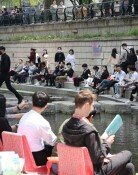Supreme Court ruling finds in favor of forced draft victims
Supreme Court ruling finds in favor of forced draft victims
Posted May. 25, 2012 06:34,
The Supreme Court on Thursday handed down a ruling that demands Japanese companies pay damages to Koreans forcefully drafted into the military under Japanese colonial rule. The ruling reversed a verdict of Japan`s highest court on the same lawsuit filed by the victims.
The Korean courts decision is the first that finds in favor of Korean victims of forced draft. The victims have sued for damages against the Japanese government and companies in Korea, Japan and the U.S.
The Supreme Court overturned lower court rulings at an appellate hearing for a lawsuit against Mitsubishi Heavy Industries and Nippon Steel filed by nine Koreans who were forced to serve in the Japanese military from 1941 to 1944.
"The 1965 Korea-Japan treaty was not to claim damages against Japan but to square financial and civil debts owed by Japan under a political agreement between governments, the ruling said, adding, The right to claim damages by forced draft victims has not disappeared since the treaty contains nothing that prevents an individual from seeking damages inflicted by inhumane and illegal acts committed by Japan or illegal acts directly related to Japanese colonial rule.
Japan`s highest court had ruled against the plaintiffs in 2003 and 2007, saying, The application of laws on the general mobilization and drafting of Koreans is valid because Japanese colonial rule of Korea was legitimate.
In 2009, the Busan High Court and the Seoul High Court also ruled against the plaintiffs on the grounds that approving a Japanese ruling`s validity by a Korean court did not violate the spirit of the Korean Constitution, and that the statute of limitations under which rights under civil law can be exercised had expired.
The Supreme Court of Korea said, however, "The ruling of Japan`s highest court goes against the core values of the Constitution of Korea in that the forced draft by Japan was in and of itself illegal. Therefore, (the Japanese ruling`s) validity cannot be recognized.
In siding with the forced draft victims, the Korean Supreme Court presented four key reasons: the ruling of Japan`s highest court against the plaintiffs cannot be accepted; the identities of the former Mitsubishi Heavy Industries and Nippon Steel, which drafted Koreans into the military under Japanese colonial rule, and the current Mitsubishi and Nippon Steel are identical with the former companies that forcefully mobilized Koreans during the Japanese colonial rule; the right of the victims to claim damages has not expired; and the statute of limitations to claim compensation under the civil code remains valid.
If no additional issues are raised, the Busan and Seoul courts will likely rule in favor of the plaintiffs at hearings for the revived case, said experts. The courts will determine compensation at the hearings as well.
The plaintiffs sought compensation ranging from 100 million to 101 million won (84,500 to 85,300 U.S. dollars).
In Korea, 224,835 people have registered with the government as forced draft victims under Japanese colonial rule. After the ruling, support organizations for the victims issued a statement, saying, Though belated, today will go down in history as the second liberation day and the day in which Korea regained its judicial sovereignty.
minki@donga.com sunggyu@donga.com







